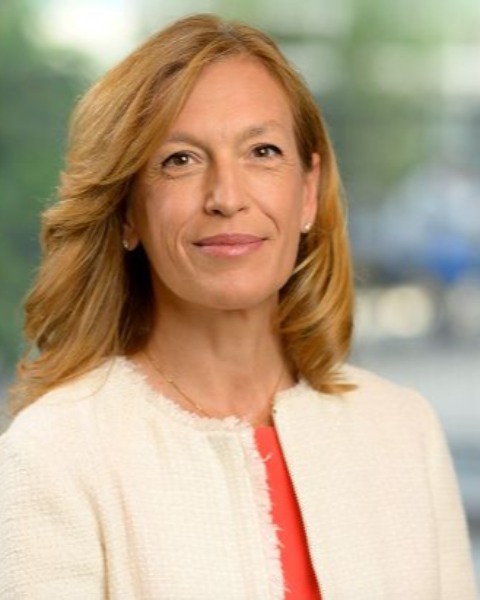Upper GI
90: Pathological complete response to FLOT chemotherapy with or without durvalumab in resectable gastric and gastroesophageal junction cancer: subgroup analysis by region from the phase 3, randomized, double-blind MATTERHORN study

Daniela Molena, MD (she/her/hers)
Director of Esophageal Surgery
Division of Thoracic Surgery, Memorial Sloan Kettering Cancer Center
New York, New York, United States- YJ
Yelena Y. Janjigian, MD
Chief
Gastrointestinal Oncology Service, Memorial Sloan Kettering Cancer Center
New York, New York, United States - SA
Salah-Eddin Al-Batran, MD
Medical Director
Institute of Clinical Cancer Research, Krankenhaus Nordwest, University Cancer Center
Frankfurt, Germany - ZW
Zev A. Wainberg, MD
Professor of Medicine
Department of Gastrointestinal Medical Oncology, David Geffen School of Medicine at UCLA
Los Angeles, California, United States - EV
Eric Van Cutsem, MD, PhD
Head of Digestive Oncology
Department of Gastroenterology/Digestive Oncology, University Hospitals Leuven and KU Leuven
Lueven, Belgium 
Daniela Molena, MD (she/her/hers)
Director of Esophageal Surgery
Division of Thoracic Surgery, Memorial Sloan Kettering Cancer Center
New York, New York, United States- KM
Kei Muro, MD, PhD
Chief and Director
Department of Clinical Oncology, Aichi Cancer Center Hospital
Nagoya, Japan - WH
Woo Jin Hyung, MD, PhD
Director
Department of Surgery, Yonsei University College of Medicine,
Seoul, Republic of Korea - LW
Lucjan Wyrwicz, MD, PhD
Head of Department
Department of Oncology and Radiotherapy, Maria Sklodowska-Curie National Research Institute of Oncology
Warsaw, Poland - DO
Do-Youn Oh, MD, PhD
Professor
Division of Medical Oncology, Department of Internal Medicine, Seoul National University Hospital; Cancer Research Institute, Seoul National University College of Medicine
Seoul, Republic of Korea - TO
Takeshi Omori, MD, PhD
Director
Department of Gastroenterological Surgery, Osaka International Cancer Institute
Osaka, Japan - MM
Markus Moehler, MD, PhD
Head of the Gastroenterological and Oncology Outpatient Clinic
Research Center for Immunotherapy (FZI), Johannes Gutenberg-University Clinic
Mainz, Germany - MG
Marcelo Garrido, MD
Medical Director
SAGA Clinical Trial Centre and Universidad Mayor
Santiago, Chile - SO
Sulene CS Oliveira, MD
Residency Coordinator
Clinical Oncology, The Clinical Research Center, Northern Riograndense League Against Cancer
Natal, Rio Grande do Norte, Brazil - ML
Moishe Liberman, MD, PhD
Associate Professor
Division of Thoracic Surgery, Department of Surgery, Centre Hospitalier de l'Université de Montréal, Centre de Recherche du CHUM
Montréal, Quebec, Canada - VO
Victor C. Oliden, MD
Director General
National Institute of Neoplastic Diseases (INEN) and Detecta Clínica
Lima, Peru - MB
Mehmet Bilici, MD
Professor
Department of Medical Oncology, Atatürk University Faculty of Medicine
Erzurum, Turkey - JK
John Kurland, MD
VP, Global Product Leader
AstraZeneca
Gaithersburg, Maryland, United States - IX
Ioannis Xynos, MD, PhD
Global Clinical Head
AstraZeneca
Cambridge, United Kingdom - HM
Helen Mann, MSc
Senior Director, Statistics
AstraZeneca
Cambridge, United Kingdom - JT
Josep Tabernero, MD, PhD
Director
Medical Oncology Department, Vall d’Hebron Hospital Campus & Institute of Oncology (VHIO), IOB-Quiron, UVic-UCC
Barcelona, Spain
Abstract Presenter(s)
Author(s)
Gastric and gastroesophageal junction cancer (GC/GEJC) together are the fifth most diagnosed cancer globally (Sung H, et al. CA Cancer J Clin 2021). While such advances as neoadjuvant-adjuvant 5-fluorouracil, leucovorin, oxaliplatin and docetaxel (FLOT) chemotherapy have improved outcomes in operable GC/GEJC, 5-year overall survival (OS) remains poor (45%; Al-Batran SE, et al. Lancet 2019). Addition of immune checkpoint inhibitors to chemotherapy has shown favorable outcomes vs chemotherapy alone in locally advanced/metastatic GC/GEJC and other cancers. MATTERHORN assesses the efficacy and safety of neoadjuvant-adjuvant durvalumab (D; anti-PD-L1) plus FLOT chemotherapy in participants (pts) with resectable GC/GEJC.
Methods:
Adults aged ≥18 years with histologically confirmed, resectable ( >T2 N0-3 M0 or T0-4 N1-3 M0, per AJCC 8th edition), untreated GC/GEJC were randomized 1:1 to D 1500 mg or placebo (PBO) every 4 weeks (Q4W) on Day 1 plus FLOT Q2W on Days 1 and 15 for 4 cycles (2 cycles each neoadjuvant/adjuvant), followed by D 1500 mg or PBO on Day 1 Q4W for 10 further cycles. Randomization was stratified by region (Asia vs non-Asia), clinical lymph node status (positive vs negative), and PD-L1 expression status (tumor area positivity score ≥1% vs < 1%). The primary endpoint is event-free survival; key secondary endpoints are OS and pathological complete response (pCR) rate (proportion of pts with no residual viable tumor in resected specimens, determined by central pathology review using modified Ryan score). Superiority for pCR for D plus FLOT vs PBO plus FLOT is being assessed at interim analysis (data cut-off: February 1, 2023, after the last pt was randomized and underwent/was precluded from surgery) using a stratified Cochran-Mantel-Haenszel test (nominal significance level of 0.1% [2-sided]). In this subgroup analysis of MATTERHORN, pathological response outcomes will be assessed by region and country of interest, along with other clinically relevant subgroups.
Results: TBD
Conclusions: TBD
Learning Objectives:
- Upon completion, participants will be able to describe the study design and global reach of the MATTERHORN study
- Upon completion, participants will be able to describe pathological complete response results from MATTERHORN
- Upon completion, participants will be able to describe pathological complete response results from MATTERHORN in specific geographic regions
